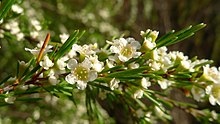This is an old revision of this page, as edited by Wimpus (talk | contribs) at 07:31, 1 October 2019 (→Taxonomy and naming: The combination of linea and folium would probably result in lineifolius/a/um instead. Added source that explains the full compound and removed the source that was used for OR-etymology.). The present address (URL) is a permanent link to this revision, which may differ significantly from the current revision.
Revision as of 07:31, 1 October 2019 by Wimpus (talk | contribs) (→Taxonomy and naming: The combination of linea and folium would probably result in lineifolius/a/um instead. Added source that explains the full compound and removed the source that was used for OR-etymology.)(diff) ← Previous revision | Latest revision (diff) | Newer revision → (diff)
| Baeckea linifolia | |
|---|---|

| |
| Scientific classification | |
| Kingdom: | Plantae |
| Clade: | Tracheophytes |
| Clade: | Angiosperms |
| Clade: | Eudicots |
| Clade: | Rosids |
| Order: | Myrtales |
| Family: | Myrtaceae |
| Genus: | Baeckea |
| Species: | B. linifolia |
| Binomial name | |
| Baeckea linifolia Rudge | |
| Synonyms | |
|
Baeckea linifolia Rudge f. linifolia | |
Baeckea linifolia (swamp baeckea, or weeping baeckea is a heathland shrub found in three Australian mainland states: New South Wales, Queensland and Victoria, where it is rare. It grows up to 1.5 metre high, (up to 3 metres according to VicFlora). It grows in heath in damp places, often near waterfalls and gullies, along the coast and adjacent ranges.
Description
Baeckea linifolia is an erect shrub with branches having drooping tips. The leaves are linear and widely spaced, linear (more or less terete) and growing close to the stem. They are 5 to 15 mm long, acute at the end and having a tapering base. The solitary, axillary, flowers are white and up to 5 mm across on pedicels (stems) which are 1.5–2 mm long. The calyx lobes are triangular. The petals are ovate and 1.5 to 2.5 mm long. There are 8 to 15 stamens, none of which is opposite the petals on curved filaments. The flat-topped ovary has two cells. The fruit is cup-like and the seeds are angular.
In Victoria it flowers mainly from December to March. (In the Sydney region, Fairley and Moore have it flowering mainly in January and February.)
In Victoria it is found in low swampy heaths from Cann River eastward and northward.
Victorian plants typically have smaller, more rigid leaves in comparison with plants found in New South Wales and Queensland, and were previously included in Baeckea linifolia var. brevifolia F.Muell. ex Benth.
Taxonomy and naming
Baeckea linifolia was first formally described in 1807 by Edward Rudge and the description was published in Transactions of the Linnean Society of London fom a specimen collected "near Port Jackson". The specific epithet (linifolia) is derived from the Latin words linum meaning "flax" and folium meaning "leaf".Cite error: A <ref> tag is missing the closing </ref> (see the help page).
}}
External links
- Baeckea linifolia Occurrence data from the Australasian Virtual Herbarium
- [REDACTED] Media related to Baeckea linifolia at Wikimedia Commons
- ^ Cite error: The named reference
apniwas invoked but never defined (see the help page). - ^ Rudge, E. (1807) Description of Seven New Plants from New Holland. Transactions of the Linnean Society of London 8: 297, t. 12. Retrieved 21 January 2019.
- ^ Fairley, A. & Moore, P. (2010) Field Guide to the Native Plants of the Sydney Region, ISBN 9781741755718 page 276. Allen and Unwin.
- ^ Wilson, P.G. (1997) PlantNET: Baeckea linifolia. National Herbarium of New South Wales, Royal Botanic Garden, Sydney, Australia.] Retrieved 21 January 2019.
- ^ VicFlora: Baeckea linifolia. Flora of Victoria, Royal Botanic Gardens Foundation Victoria. Retrieved 21 January 2019.
- Rudge, Edward (1807). "Seven new species of plants from New Holland". Transactions of the Linnean Society of London. 8: 297. Retrieved 25 January 2019.